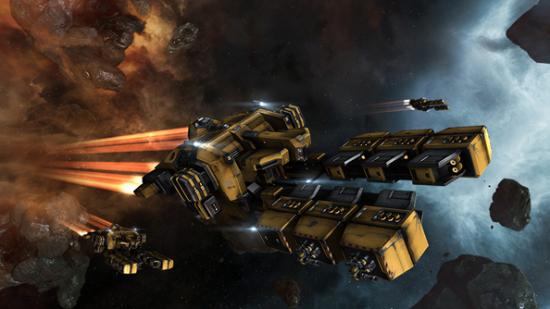It is 2002, and Hilmar Veigar Pétursson is fresh from the three year development cycle of an ambitious interstellar MMO that has left him and his isolated Icelandic team somewhat “psychotic”.
He is on paternity leave; mum and baby are asleep. And so, with his new daughter coddled in arms outstretched to reach keyboard and mouse, Hilmar plays Eve Online.
He begins cataloguing its bugs. The game, he concludes, is a mess. Hilmar cannot understand why anybody would voluntarily spend their time shifting minerals between its systems. And then this sorry state of affairs takes a turn for the worse.
The mining corp Hilmar has joined incognito (“It’s a small country,” he tells his comrades when asked if he knows CCP) have uncovered an exploit.
“They have found a new way to play the game, which is the wrong way,” says Pétursson, recalling the event from Quo Vadis in Berlin.
In Eve Online as CCP originally designed it, players acquire minerals, take them to a space station, manufacture goods, sell the goods on the open market, and then see them destroyed in wars. The developers had meticulously calculated the size of cargo holds, to carefully limit how much miners could yield over time.
Slowly, however, it dawns on Hilmar that his corp have broken down this “core loop” using a process nowadays known as ‘jet canning’: whereby miners eject their cargo containers into space, and use a hauler to pull them back and forth from the fields to the stations.
“Oh my god, the game is ruined,” thinks Hilmar, doing the maths as he participates in the crime. “Everyone will have a battleship in three months. We had calculated that everyone would have a battleship for three years. Oh my gosh, they have ruined the game, all the content will be over, the story of Eve Online is done by December.”
On the verge of a “nervous breakdown”, Hilmar decides to send an email to the team asking that they put a stop to the haulage bug – when he finally realises what he’s seeing.
The corp are working together, calling out their hauls to each other. They have turned a “very rudimentary” element of Eve, its mining, into a collaborative experience. And even better, they’ve created a new trust dynamic – in asking the hauler not to run off with the minerals.
“Wait a minute – this is a much better way to play the game,” concludes Hilmar. “This is a much better game mechanic than anything we came up with. It does trust, it does consequences, it’s social. It turns something boring into something entertaining because people are filling the vacuum of the game with interesting things.”
And so Hilmar didn’t send his email – instead encouraging the team to take a “leap of faith”. The exploit did its work, and CCP’s calculations were for naught. But as we all now know, an “interesting thing” happened – the game became self-regulating, working according to its own player-made dynamics of world domination and limited resources.
“The game turned out much better the way players played it,” says Hilmar of the now 10-year-old MMO. It’s hard to disagree, isn’t it?
